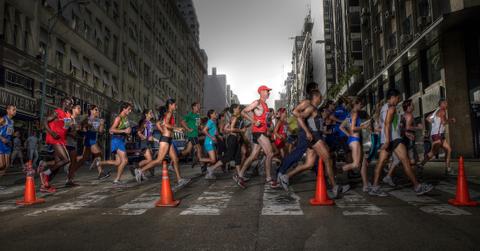Why Does Running a Marathon Make You Poop? Mystery Explained
Apr. 16 2024, Updated 3:38 p.m. ET

Running a marathon is not for the weak of heart — or for the weak of sphincters.
Those who have attempted to complete a 26.2-mile race know that sometimes nature calls at inopportune times.
In fact, here's an underlying fear among many runners that they might poop their pants in the middle of an event in front of thousands of other people. (Because let's face it, they never have enough port-a-pots.)
But why does running a marathon make you poop, anyway? Let's take a closer look.

Why does running a marathon make you poop?
The urge to poo while running a marathon quite common. In fact, the phenomenon is often referred to as "runner's diarrhea." Others aptly call it the "runner's trots."
There are a number of reasons running a marathon makes you poop. For starters, a shift in blood flow occurs. "During physical exercise, the increased activity of the sympathetic nervous system (SNS) redistributes blood flow from the splanchnic organs to the working muscles," a 2012 review published in the National Library of Medicine explains. "A severely reduced [blood flow to the abdominal gastrointestinal organs] may frequently cause GI ischaemia."
This causes symptoms such as abdominal pain, diarrhea, nausea and vomiting, and more.
Another contributing factor to runners prairie-dogging-it during a marathon has to do with the anal sphincter taking a back seat to other muscle groups. (You know, like leg muscles.)
"Someone in the middle of a strenuous physical activity, it’s really hard to voluntarily keep the muscle closed while engaging in other activities with other muscles in the legs and pelvis," Michael Dobson, DO, a colon and rectal surgeon at Novant Health in Charlotte, N.C., told Mental Floss in 2021. "You can’t control the muscle when using muscle.”
There's also the rhythmic sloshing of the contents of your stomach and jostling of intestines while running — both of which don't exactly help the poo situation.

How many runners poop their pants?
According to a study published in 1992 in the National Library of Medicine, folks experiencing gastrointestinal distress before, during, and after long-distance running is pretty common. The study asked 109 long-distance runners about their poo habits in relation to the sport. Here's what it found:
- 62 percent said they had stopped to poop while training
- 43 percent said they had nervous diarrhea before a race
- 51 percent said they had diarrhea after a race
- 12 percent reported pooping their pants while running
- These instances often involved abdominal pain and rectal bleeding.
Furthermore, "any form of 'runners' diarrhea was unrelated to age, previous intestinal infection or food poisoning, food allergies, or dietary fiber."

Marathon poop photos and videos have gone viral over the years.
Warning: Click on links to poop photos at your own risk.
Unfortunately for everyone involved, there is no shortage of photo and video evidence of marathon runners having publicly crapped their pants or actively squatting to drop the kids off at the pool.
A viral poop incident from the 2023 Boston Marathon involved a video of a runner defecating in someone's front yard.
At the 2005 London Marathon, Paula Radcliffe had to stop multiple times to poop in front of not only a crowd but also TV cameras. But hey, she ended up finishing in first place for women. So she made a strategic decision.
Another infamous poop photo went down at the 1982 World Ironman Championship in Hawaii when Julie Moss pooped her pants.
Who could forget Micke Ekvall, who experienced a case of the runner's trots and subsequently pooped his pants during the Göteborg half-marathon in 2008?
Tiktok star Davis Clark went viral in April 2024 for pooping his pants during the Boston Marathon. He posted a video talking about how hard he pushed himself during the race. He even pans down to his thighs to show evidence of previously mentioned poop disaster.
Davis wrote, "I gave it everything for the people...even s--t my pants to go as hard as possible."
The bottom line? S--t happens — and for long-distance runners, it happens fairly frequently during marathons.